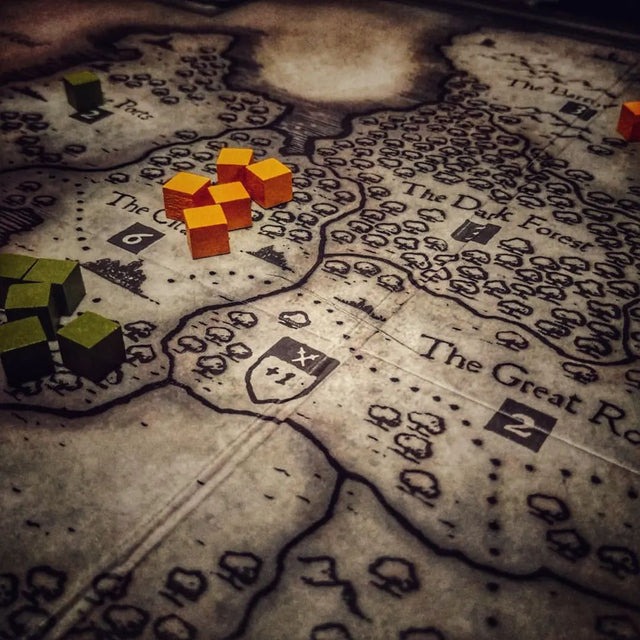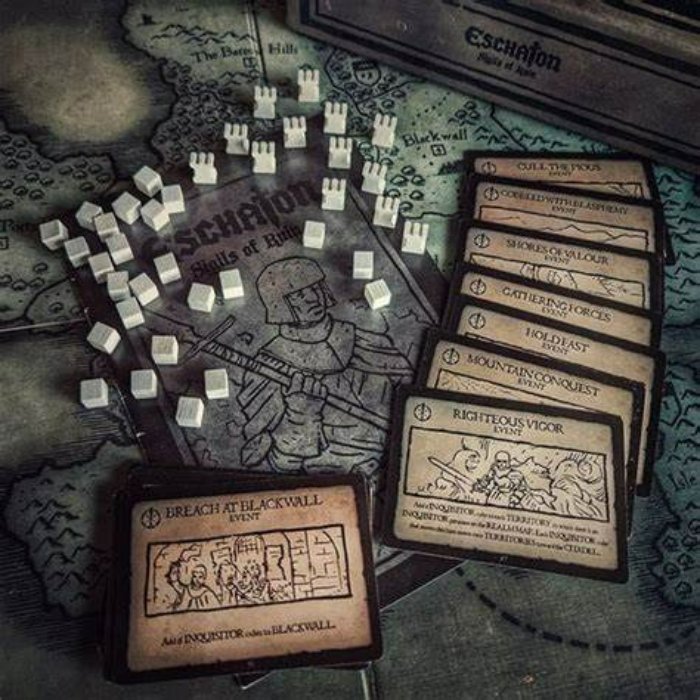Introduction to Eschaton Board Game
The Eschaton board game presents a dark, apocalyptic realm. It’s a game full of strategy and conflict. Players become cult leaders vying for dominance. They prepare for the end of times, known as Eschaton. The game has a unique mix of deck-building, area control, and strategy. It’s ideal for players who enjoy deep, thematic experiences. The aim is to win the most favor from the dark god, Eschaton.
Players begin with a small group of followers. With these followers, they perform dark deeds and expand their influence. They gain resources, recruit new acolytes, and clash with rivals. Playing Eschaton requires careful planning and strategic thinking. Players must manage their deck of cards while adapting to changing conditions. All the while, they must keep an eye on their competitors. It is a challenging but rewarding experience. This introduction sets the stage for understanding how to master Eschaton. We will explore the core mechanics and strategies. Both beginners and experienced players will find something to learn.

Core Mechanics of Eschaton
To excel in Eschaton, understanding its core mechanics is crucial. The game integrates several strategic elements that players must master. They involve deck-building, area control, and resource management. Let’s delve deeper into each aspect.
Deck-Building
In Eschaton, deck-building is the backbone of the gameplay. Players start with a basic set of cards representing followers. As the game progresses, they acquire more potent cards. These cards allow them to undertake more significant actions. Effective deck management is key. Players should aim to optimize their deck by adding powerful cards and removing less useful ones.
Area Control
Control over the game board is essential in Eschaton. The board represents different territories in the apocalyptic world. By gaining dominance over these areas, players increase their influence and power. Strategic placement of acolytes is necessary to secure territories and block opponents.
Resource Management
Resources are vital for expanding your cult’s influence. Players must carefully decide how to allocate their resources. These include followers, relics, and dark magic. Efficient resource management can lead to a significant advantage, empowering players to make crucial moves at pivotal moments.
Essential Strategies for Beginners
Embarking on the Eschaton board game as a beginner can seem daunting. Here are some simple yet effective strategies to help you start strong. Focus first on understanding the basic rules and game flow. Knowing how turns proceed and what each card does is a priority.
Learn the Basic Rules
Start with a clear grasp of the basics. Know how turns work and understand each card’s function. This will reduce confusion and increase your enjoyment of the game.
Prioritize Deck-Building Early
From the onset, focus on building a strong deck. Choose cards that complement each other. This creates powerful combinations early on.
Expand Gradually
Don’t rush to control many territories. Start small and expand as your resources grow. This tactic prevents overextension and loss of control.
Monitor Opponents
Always keep an eye on your rivals. Watching their moves can give insights into their strategies. This knowledge can help you counteract their plans effectively.
These beginner strategies aim to set a strong foundation in the Eschaton board game. As you gain more experience, you can explore advanced tactics and refine your gameplay.

Advanced Tactics for Experienced Players
For those who’ve mastered the basics of the Eschaton board game, it’s time to dig deeper into strategies that can give you a winning edge. Experienced players need to look beyond the surface and employ advanced tactics that can outmaneuver opponents and optimize their path to victory.
Understand the Power of Card Synergy
Advanced players should focus on card synergy. Look for combinations that trigger powerful chain reactions. A well-combined set of cards can turn the tide of the game.
Exploit Timing Opportunities
Timing is critical. Play the right card at the optimal moment to disrupt opponents or secure a key area. Be patient and wait for the perfect opportunity.
Optimize Resource Allocation
Mastering resource allocation is essential. Balance your resources to maintain flexibility. Don’t put all your relics in one basket.
Adapt Quickly to Game Changes
The board dynamic changes constantly. Be ready to switch strategies when necessary. Adaptability can make or break your game.
Control Key Territories
Identify and control territories that offer strategic advantages. Holding these areas can give you leverage over your rivals and increase your influence considerably.
Influence the Event Deck
The event deck can be unpredictable, but if you understand its patterns, you can anticipate and prepare for future events. This foresight can give you a strategic advantage.
Experienced Eschaton players know that a deep understanding of these tactics can lead to dominance. By honing these skills, you’re not just playing the game; you’re mastering it.
Deck-Building Strategies
In the Eschaton board game, a well-crafted deck is a key to success. Here’s how to build a deck that can navigate through the end times.
Focus on Card Quality Over Quantity
It’s not just about how many cards you have. The quality matters more. Aim for cards that offer powerful moves or strategic advantages.
Remove Weaker Cards Regularly
Keep your deck lean by removing weaker cards. This increases the odds of drawing your best cards when you need them.
Look for Combo Cards
Some cards work better together. Find and use these combos to amplify your moves.
Balance Card Types
Include a mix of action, power, and resource cards. A balanced deck handles more situations effectively.
Pay Attention to the End-Game
As the game progresses, adjust your deck. Add cards that will be useful in the final rounds of play.
By using these deck-building strategies, players of the Eschaton board game can set themselves up for a stronger performance. Remember, a solid deck can be the difference between victory and defeat.

Balancing Offense and Defense
Navigating through the strategic landscape of the Eschaton board game demands balance. Strong offense and defense play are both vital to your cult’s survival and success. Here’s how to achieve this equilibrium.
Craft a Mixed Deck
Ensure your deck has a mix of aggressive and protective cards. This way, you can attack when needed and defend your territories effectively.
Evaluate Your Position Constantly
Regularly assess your standing on the board. Adapt your strategy to focus on offense or defense as the situation requires.
Forge Temporary Truces
Sometimes, it’s wise to hold off on attacking. Work with others to fend off a common threat, but be ready to break the alliance when necessary.
Utilize Scare Tactics
Threaten areas without fully committing resources. This can distract or deter opponents from your real objectives.
Defend Key Territories
Identify critical areas crucial for resources or strategic positioning. Make these a priority for your defense strategy.
Balancing offensive maneuvers with solid defense allows for a dynamic and unpredictable gameplay, keeping your opponents on their toes. By taking these steps, you can navigate the Eschaton board game with a well-rounded approach, helping secure victory with both your sharp attacks and impermeable defenses.
Importance of Allies and Diplomacy
In the Eschaton board game, forming alliances can be as crucial as any in-game strategy. Having allies can greatly enhance your chances of survival and victory. Here are some points on why diplomacy and allies are important in Eschaton:
Forge Partnerships Early
Establish alliances early in the game. It will help you secure support when you need it the most. Early alliances can deter others from attacking you, as they might fear retaliation from your allies.
Choose Allies Wisely
Not all players make good allies. Pick players whose game objectives align with yours. This mutual benefit will ensure a stronger and more reliable alliance.
Use Diplomacy to Avoid Conflict
Negotiations and discussions can help avoid unnecessary conflicts. Use diplomacy to resolve disputes or to share resources strategically. This can save resources for both parties, allowing focus on bigger threats.
Temporary Truces
Temporary truces can be useful. They give you time to regroup or focus resources elsewhere. But remember, these truces are temporary. Always be prepared for the possibility that they might end.
Benefits from Trade
Alliances often facilitate trade. Trade surplus resources with allies to get what you need. This can boost both parties’ chances of winning.
Betrayal as a Strategy
Be cautious, as betrayal is a part of the game. Always keep an eye on the actions of your allies. Preparedness for any betrayal can protect your position and resources.
Leveraging effective diplomacy and cultivating the right alliances can often turn the tide in the Eschaton board game. These strategies are essential as they can make or break your game plan.
End-Game Scenarios and How to Prepare for Them
As the Eschaton board game reaches its climactic final rounds, your strategies must adapt. Here are critical preparations to handle end-game scenarios effectively:
Anticipate Opponent Moves
Predict and counter your opponents’ strategies. This foresight keeps you a step ahead.
Secure Key Areas
Hold onto areas vital for your resources and influence. This solidifies your position.
Optimize Your Deck
Fine-tune your deck. Remove cards that are less useful in the late game. Focus on high impact cards.
Manage Resources Strategically
Allocate resources carefully. Ensure you have enough to make last-minute plays.
Assess Victory Points
Keep track of your Victory Points. Know what you need for a win. Plan moves to close any gaps.
Prepare for Sudden Shifts
The board may change rapidly. Stay flexible and ready to adapt your strategies.
End-game mastery can shift the balance in your favor. By preparing early and adapting quickly, you can thrive even in the toughest end-game scenarios of Eschaton.